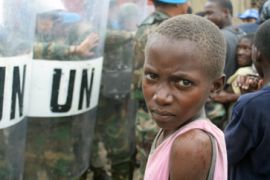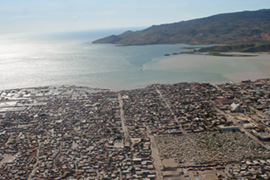Haitians face climate despair
Food insecurity and unrest follow floods and destruction of local forests in Haiti.

The people of Haiti have reason to fear the hurricane season; every time such a powerful weather system strikes their island, it leaves death and devastation in its wake.
Their fears have been compounded by extreme poverty and massive deforestation which have left the population vulnerable to strong winds, mudslides and flooding.
Keep reading
list of 4 itemsCould shipping containers be the answer to Ghana’s housing crisis?
Thousands protest against over-tourism in Spain’s Canary Islands
Holding Up the Sky: Saving the Indigenous Yanomami tribe in Brazil’s Amazon
Last year, the city of Gonaives was hit by four consecutive tropical storms that killed some 800 people and caused $1bn of damage.
The city was completely under water because the deforested mountains no longer acted as a natural barrier to severe rain water flowing down. Thousands of Haitians were left seeking refuge on their rooftops.
“We are afraid because the area gets completely submerged in water. The mudslides collapsed on top of our houses and there wasn’t much we could do,” a woman from Gonaives tells Al Jazeera.
Years of violence
| in depth | |||||||||||
|
Experts say that the situation is likely to worsen as hurricanes strengthen and ocean temperatures rise due to global warming.
Haiti is the western hemisphere’s poorest country with nearly 80 per cent of the population living in poverty and the government unable to deal with the chaos caused by natural disasters.
United Nations peacekeeping troops are in charge of maintaining security after years of violence but they will not be there forever.
“The hurricanes and floods… put pressure on the population and institutions,” says Mark Schneider, senior vice-president of the International Crisis Group and an expert on Haiti.
“The continued removal of trees complicates the situation more. Even when there are mild storms, Haiti is exposed to major flooding. People get frustrated because they don’t have resources to respond.”
Formerly known as the “Pearl of the Carribean” because of its natural resources – chiefly sugar cane and wood – Haiti’s deforestation began during the colonial era and only two per cent of its trees now remain.
These days Haitians, most of whom have no access to electricity or gas, use the few remaining trees as charcoal.
So far this year, Haiti has been spared but everyone knows that the hurricanes will return.
The UN is preparing for their return by building canals on the mountains in an effort to prevent flooding and distributing food supplies so that if areas are cut off by flooding, people trapped there will not go hungry.
Aid shortfall
Haiti is also working with Cuba and the Dominican Republic to present a plan – which would see a biological corridor put in place with the aim of protecting endangered areas and those living in them – to the UN climate change conference in Copenhagen in December.
 |
| Haiti, Cuba and the Dominican Republic are compiling a climate change plan [Craig Mauro] |
“The Caribbean countries like Haiti and Cuba are getting together to help each other to deal with the global warming effects,” JM Claudet Germain, Haiti’s environment minister, says.
“The problem we have is the money. We need to get ready to protect certain areas but the money we get is not enough.”
Haiti is heavily dependent on international aid; donor countries have vowed to contribute $320m but, so far, Haiti has received only a small percentage of what was promised and the global financial crisis has further hindered aid distribution.
Many donor nations have also grown frustrated by the failure of aid money to reach those who need it most; while billions of dollars have been poured into the country over the years, most of the population continue to live on a dollar a day, and widespread corruption and mismanagement is considered to be partly to blame.
Long road to recovery
|
“The continued removal of trees complicates the situation… Even when there are mild storms, Haiti is exposed to major flooding. People get frustrated because they don’t have resources to respond” Mark L Schneider, International Crisis Group |
Bill Clinton, the former US president and current UN special envoy to Haiti, says that with a stable government in place and improving security, it is the right time for donor nations to make a long-term commitment to help Haiti recover from last year’s hurricanes and to improve the lives of millions of Haitians.
With poverty, food shortages and deforestation making Haiti one of the countries most vulnerable to the effects of global warming, the UN special envoy has warned that the financial aid needed will rival that generated after the 2005 tsunami in the Pacific region.
But Clinton, who addressed the UN last month, remains upbeat despite making it clear that Haiti’s road to recovery will be long and hard.
“In spite of the absence of basic infrastructure and the inadequacies of health, education and other areas… I am convinced that Haiti has a remarkable opportunity to escape the chains of its past,” he says.
